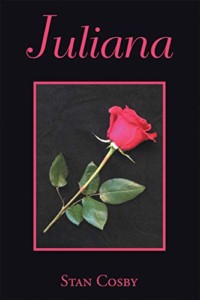Title: Juliana
Author: Stan Cosby
Publisher: AuthorHouse
ISBN: 9781728361352
Pages: 110
Genre: Historical fiction
Reviewed by: Anita Lock
Pacific Book Review
An encounter with a spiritual recluse miraculously changes the life of one troubled girl in
author Stan Cosby’s debut, Juliana.
Margery (Maggie) Brunham’s escape from her brutal father takes her to the steps of St.
Margaret’s Convent. Once the nuns care for her, Maggie had no idea what to expect
when she is sent to whom she believes to be the Mother Superior. Instead, Maggie
surprisingly comes face-to-face with a sagacious woman without a habit, calling herself
Dame Julian, but directing Maggie to call her Juliana. Maggie follows Juliana’s advice to
get her life turned around in a positive direction. Feeling energized spiritually, Maggie
returns to her cruel father to forgive him, only to find out that he is on his deathbed.
Unbeknownst to Maggie, her father has bequeathed guardianship over Maggie’s estate
to a cousin, John Kempe; he also wants John to marry her. John, who is hesitant with
the latter, fears that he would place Maggie in grave danger because of his connections
with so-called heretics killed by Henry le Despenser, Bishop of Norwich. (Despenser is
a staunch crusader against Lollardism, a pro-Protestants movement, sparked by John
Wycliffe, a former Roman Catholic theologian who had criticisms against the Church.)
It’s not until Kempe meets with Juliana and he receives her blessing that he pursues
Maggie. What unfolds is an unprecedented tale of miracles, deep faith, and hope.
First-time author Stan Cosby presents a late-medieval English story of hope amid
despair. Cosby includes a full cast of characters, with the slight exception of two figures,
that are all placed within historical events. Juliana is a fictional version of Julian of
Norwich, “a very famous, even-in-her-day, anchoress [secluded spiritual woman] who
offered profound spiritual direction to the East Anglicans of the 13th and 14th century,”
as Cosby states in his introduction. Since there is little background information on Lord
Brunham, the father of Cosby’s main character, Maggie (Margery Kempe), Cosby has
taken literary license to create the story’s antagonist.
Cosby pulls from primary sources (Revelations of Divine Love and The Book of Margery
Kempe) and, capturing that period’s language, incorporates authentic dialogue within
his narrative. Amid the antiquated and religiously-laced lingo are well-developed, reallife
characters rife in the human experience: hopes, dreams, forgiveness, love, and a multitude
of struggles—i.e., fear, regret, guilt, anger, hate.
Juliana is more than a retelling of the profound relationship between an anchoress
and a girl with a destiny. It is a story that zeros in on the unprecedented veneration
of two women during a heinous “religious cleansing” period. Cosby does a stellar job stitching
in descriptions that capture the sights, sounds, and smells of late medieval England,
providing readers with an understanding of life for women, especially religious women,
within an era of heretical killings.
Cosby’s debut is a short read. He keeps his chapters clipped; his writing style sure.
While Cosby has a religious background, his approach to storytelling is not a means of
preaching the Gospel. His style reaches out to readers beyond historical and religious
aficionados. Juliana is a highly inspirational read that reaches a wide audience.


